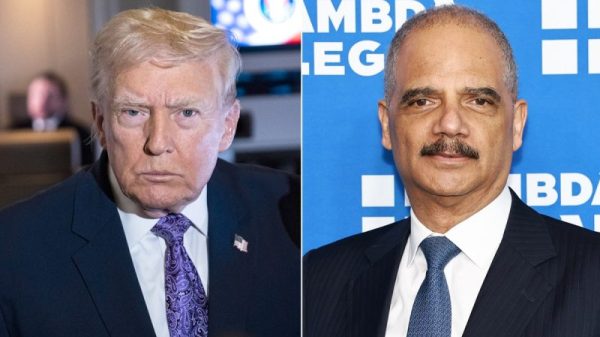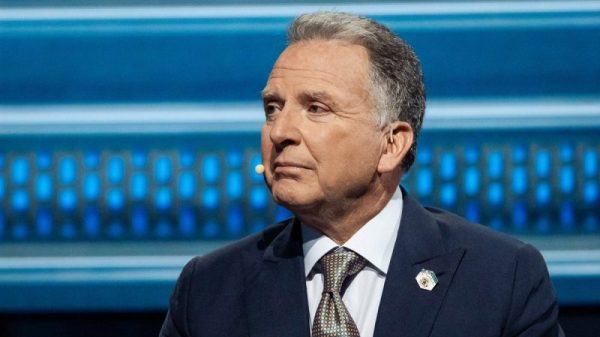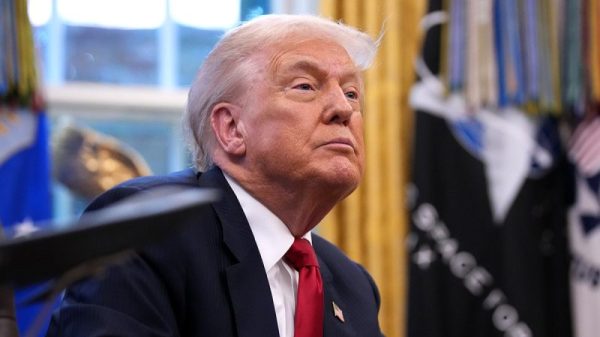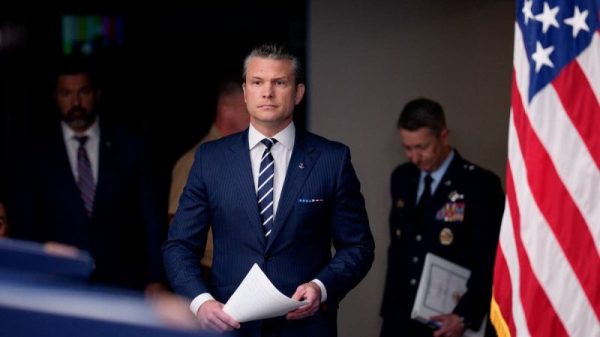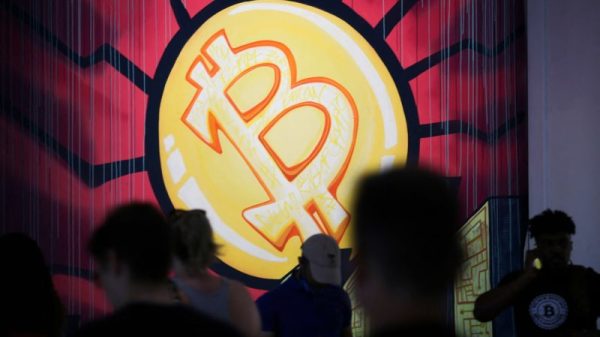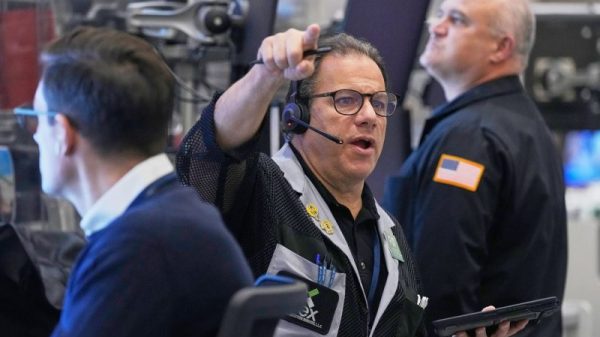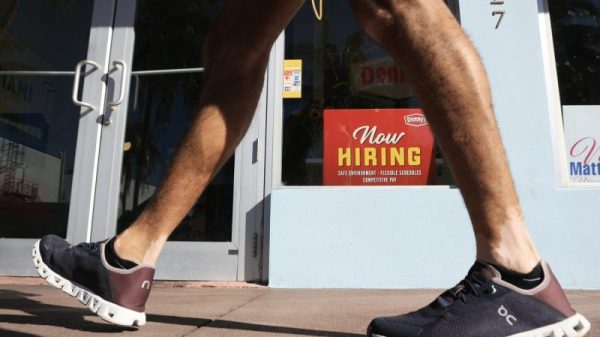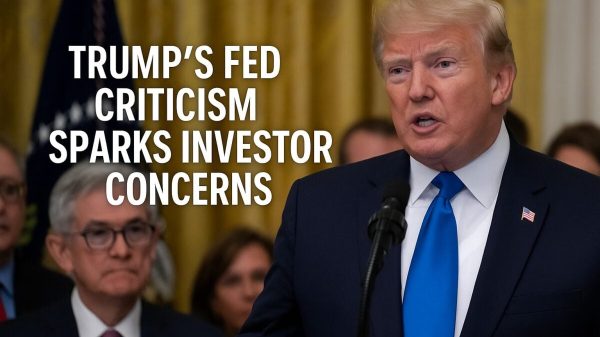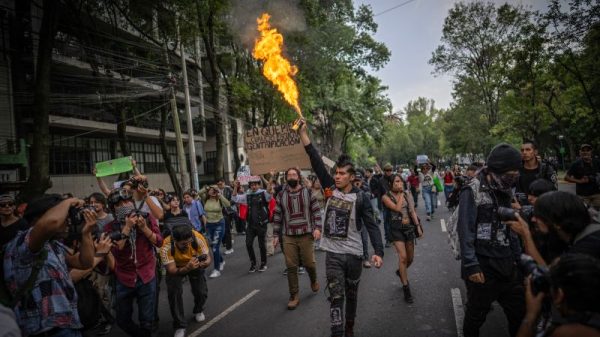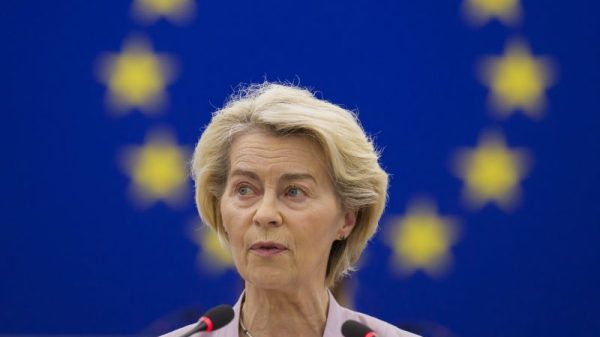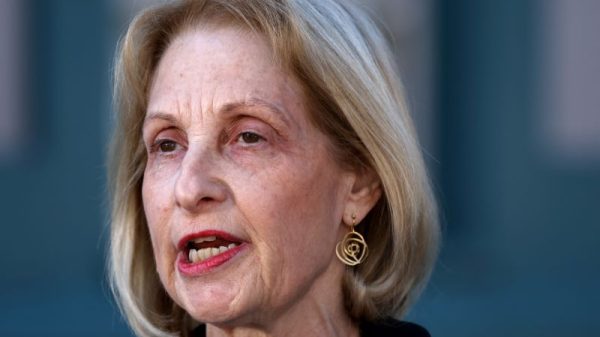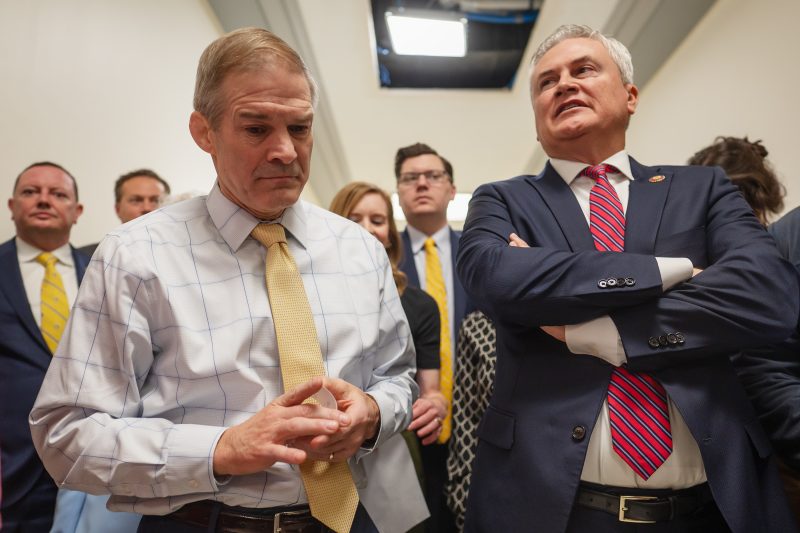In the interregnum between Democrats losing control of the House in the 2022 midterm elections and Republicans taking control in January, senior members of the chamber’s Republican conference began discussing their wide-ranging attack on President Biden.
Speaking to The Washington Post a year ago, Rep. James Comer (R-Ky.), then the top Republican of House Oversight, pledged to use the power he would gain when assuming control of that committee to “determine if this president and this White House are compromised because of the millions of dollars that his family has received from our adversaries in China, Russia and Ukraine.” He would begin with “probes,” he said, and, if necessary, move on to “investigations.” The desired outcome wasn’t political, Comer suggested, but aimed at developing “a legislative fix” to address influence-peddling.
This is not how Comer’s first year running Oversight worked out. Instead of using his majority to methodically flesh out the existing allegations against the president, Comer and his allies — including Rep. Jim Jordan (R-Ohio), chairman of the House Judiciary Committee — found themselves offering up baseless or debunked allegations to a conservative media ravenous for them. Throughout 2023, Comer, Jordan and their allies made little progress toward Comer’s stated target — but did manage to significantly erode their credibility.
This is most easily demonstrated by considering the slew of allegations and insinuations that Comer in particular offered as 2023 unfolded.
It took a bit, as you may recall, for Republicans to formalize their majority in the House. Once that task was completed, however, Comer and his committee got to work.
“Now that Democrats no longer have one-party rule in Washington, oversight and accountability are coming,” Comer said in a statement on Jan. 11. That announcement included some theoretical targets of probes, including the idea that the company then known as Twitter had perhaps muffled New York Post reporting about Biden. This was revealing: thanks to Elon Musk’s purchase of Twitter and efforts to present the previous owners as biased against the right, investigations of Twitter were very much in vogue in right-wing circles at the time.
Comer also promised to get to the bottom of scores of bank suspicious activity reports (SARs), reported the previous April by CBS News.
Oversight issued letters requesting information from President Biden’s son Hunter, the president’s brother James and one of Hunter and James’s former business partners.
“If President Biden is compromised by deals with foreign adversaries and they are impacting his decision-making,” Comer reiterated in a statement, “this is a threat to national security.”
By March, Republicans were ready to begin releasing a slow trickle of information about the monetary interactions between Hunter Biden, James Biden and their business partners. In the middle of the month, Oversight released the first of several “bank memos” that detailed money received by the Bidens or their associates and some of those who received it. None of those recipients was the president.
The Post would later walk through many of the allegations — including claims of millions of dollars flowing to the Bidens and of numerous “shell companies” — and would reveal them to be overstated or false.
Immediately, though, it was hard to avoid comparing the business arrangements of Hunter and James Biden with those of Donald Trump’s family. The Oversight presentation of Biden’s culpability uniformly also applied to the Trumps — but the scale of the former president’s family’s interactions was far more substantial. Another difference was that the former president himself was an obvious beneficiary, even while in office.
It was also during March that the New York Times reported that Comer had spiked an ongoing investigation into Trump’s business arrangements.
Oversight deposed Kathy Chung, a former aide to Biden during and after his service as vice president. Chung was of interest because she’d helped pack up material from his time in office — of interest because Biden’s attorneys had turned over documents with classification markings to the government.
The primary outcome of Chung’s testimony, it seems, was that she explained how some of the documents from Biden’s service as vice president (documents that are not known to have been marked as classified) were stored briefly at an office in D.C.’s Chinatown neighborhood.
This prompted Trump to claim that Biden was somehow keeping them there because of ties to the Chinese government, using a rhetorical mechanism that similarly proves that all Georgetown University graduates are in cahoots with former New York congressman George Santos.
May was a banner month for Comer.
The Republican majority on the Oversight Committee called a news conference to present the accrued evidence of how Hunter and James Biden sold consulting and legal services to various partners, including foreign ones. That the president’s son and brother were making money off their last name had been well-established previously, so reporters often focused instead on the lack of a connection to the president.
Comer also partnered with Sen. Charles E. Grassley (R-Iowa) to claim that evidence existed of an “alleged criminal scheme involving then-Vice President Biden and a foreign national relating to the exchange of money for policy decisions,” as a letter sent to the Justice Department claimed. This evidence was in the form of an interview conducted with an informant who claimed to have been told about payoffs of $5 million to Joe and Hunter Biden.
Comer and Grassley spent most of May trying to get the FBI to release the interview; the Bureau declined, noting both that the allegation was unverified and that doing so would put the informant at risk. Instead, the FBI allowed legislators to view the document. Grassley eventually just shared the whole thing on social media, though he said he had no idea if the allegation was true. That the person making the allegation — Mykola Zlochevsky, the founder of a Ukrainian energy company called Burisma — had also told people that he never had any contact with Joe Biden was ignored. No evidence beyond the informant’s description of the claim ever emerged.
There was an additional bit of intrigue here, though. At one point, Comer appeared for an interview about his investigation on Fox News. (He’s appeared on Fox hundreds of times this year, which is not unimportant for understanding what’s at play — nor is the fact that Comer is relentlessly fundraising on his status as theoretical Biden-toppler.) Host Maria Bartiromo asked him a weird question: where was this informant?
“Unfortunately, we can’t track down the informant,” Comer replied. “We’re hopeful that the informant is still there. The whistleblower knows the informant. The whistleblower is very credible.”
Within hours, his staff clarified: Comer wasn’t talking about the bribery informant being missing but, instead, another whistleblower named Gal Luft. We’ll get to him in a second.
Other whistleblowers came forward in June to accuse the Justice Department of granting favorable treatment to Hunter Biden in its investigation into alleged tax and gun violations by the president’s son. This kicked off a separate line of investigation, largely handled by the House Ways and Means Committee, and involved an increasingly sprawling he-said, he-said about how the investigation unfolded.
Hunter Biden has subsequently been indicted on gun and tax charges after a judge rejected a plea agreement he’d reached with the government. Republicans claimed credit for these indictments (which others have disputed), but there has been no evidence provided that shows Joe Biden attempted to ensure that his son was given preferential treatment.
There was also another development on the bribery-informant front: Rep. Anna Paulina Luna (R-Fla.) claimed on social media that the FBI had informed Oversight that the Bureau was “afraid their informant will be killed if unmasked, based on the info he has brought forward about the Biden family.”
This sparked a mini-hurricane of outrage on the right but was almost certainly a mischaracterization. The FBI had said all along that releasing the informant interview might reveal the informant’s identity, putting them at risk given that they were providing information to American law enforcement.
It’s worth mentioning Luna’s claim in part because this would become a pattern during the year: new developments related to those offering information about the Bidens would be presented in hyperbolic terms.
Which brings us back to Gal Luft.
In July, the Justice Department unsealed an indictment targeting Luft, the director of a D.C.-area think tank. Given that Luft had offered to provide information about his interactions with Biden, the indictment was cited by House Republicans, including Oversight’s Rep. Nancy Mace (R-S.C.) as evidence of an attempt by the government to silence a potential anti-Biden witness.
But this was backward. Luft offered to present information about knowledge of Hunter Biden’s agreement with a Chinese energy company only after he’d been detained earlier this year. The indictment was unsealed in July but had been handed down last November. Luft was arrested in February and then skipped bail — which was why he was “missing” when Comer clumsily brought him up back in May.
There’s no evidence that Luft has information that would be particularly damaging against Hunter Biden or his father.
A similar pattern unfolded at the end of the month as Oversight prepared to interview Devon Archer, a former business partner of Hunter Biden’s. Just before that testimony, Archer received an update on his previous conviction on fraud charges and subsequent efforts to appeal, which had ended a few weeks prior: he would need to begin the process of reporting for incarceration.
Comer and others howled that this was an effort to lock up Archer so that he couldn’t testify. It wasn’t, as the government made clear in a subsequent letter with almost-audible eye-rolling. Archer testified.
Also in July, House Republicans hyped text messages allegedly sent from Hunter Biden to his Chinese business partners, in which he suggested that he would bring his father’s power to bear on them if they didn’t pay up. (His father was not in office at the time.) The messages, summaries of communications sent over WhatsApp, showed a willingness by Hunter Biden to invoke his father — though they did not show actual involvement by Joe Biden.
Archer’s closed-door deposition was made public in August. Comer and his allies insisted that Archer’s testimony was damaging: that he described numerous occasions on which Joe Biden had called Hunter only to be put on speakerphone during business meetings and because he told investigators about a call placed to D.C. by Hunter Biden and Zlochevsky, the head of Burisma, on whose board Hunter Biden and Archer sat.
This was cherry-picking. Archer did say those things, though he agreed that the calls from Biden were non-substantive. Archer also testified that Hunter Biden had emailed him contemporaneously to note that they lacked the ability to leverage Joe Biden on their behalf. He testified that Joe Biden was at no point involved in their business. He even debunked the idea that Hunter Biden had been working with a Russian that had paid Archer money for a real estate deal — one of the allegations that Comer had referenced in his December 2022 Post interview.
That call to D.C. soon became a central part of Jim Jordan’s oft-repeated case against Biden, including on Fox News soon after the Archer testimony. Jordan claims that Burisma wanted Ukraine’s prosecutor general fired to block a probe into the company, which conflicts with known evidence. But most obviously, Jordan claims that the D.C. call prompted Joe Biden to fly to Ukraine — when that trip had been announced the previous month.
That call was, instead, more likely about responding to media questions involving Hunter Biden’s role with Burisma — something that raised red flags within the Obama administration and which multiple newspapers were writing stories about at the time. One of Hunter Biden’s colleagues was in contact with the White House about those stories at the same time. That contact, made public in September, was presented as damning by Comer.
Comer had obtained a cache of emails sent to Hunter Biden from a pseudonymous account set up for his father while he was serving as vice president. Comer insisted that these messages included secret messages to Hunter Biden about his partnerships, including one intended to inform Hunter Biden about that trip to Ukraine. (Which, again, had been announced publicly the previous month.) The Post’s fact-checking team noted that the explanation was almost certainly more innocuous: Hunter Biden was being kept in the loop about when he’d be back in Delaware, so his son could visit.
By the end of September, though, months of overhyping allegations against Biden to feed the right-wing media world had built enormous demand for a formal impeachment. Then-Speaker Kevin McCarthy (R-Calif.) announced an impeachment inquiry, citing as rationale things that had been debunked or remained unsubstantiated — including some that predated the Republican majority in the 118th Congress.
There was an introductory hearing as part of the inquiry, a hearing that offered no fact witnesses and only argumentation about possible wrongdoing. It was roundly mocked and no further hearings were held. Comer would later say that he didn’t think hearings were useful.
The launch of the impeachment inquiry included new subpoenas for financial records. In October, House Oversight announced that it had finally found the smoking gun: a payment of $200,000 made directly to Joe Biden.
The only problems were that it was 1) from Biden’s brother James, 2) using money from a U.S.-based business deal, 3) during the period when Joe Biden wasn’t vice president and 4) in repayment of a loan Joe had extended to James. (The evidence for this was bank records, seen by The Post, that showed a prior loan. Oh, and that the check paid to Joe Biden included “loan repayment” on the subject line.) This was not strong evidence of Vice President Biden being engaged in pay-for-play.
Curiously, there was another, similar loan that was repaid to Joe Biden in the same period, one that Comer didn’t highlight — at least not yet.
On Nov. 1, Comer and his committee published a news release focused on that second check — because they thought they could tie it back to funding provided to Hunter and James Biden from that Chinese energy company. The president had received “Laundered China Money,” the news release’s title trumpeted. Comer would repeat a similar line over and over: here was proof that Joe Biden benefited from Hunter Biden’s foreign deals.
Look, you work with what you’ve got. But this was dishonest. Being repaid for a loan you gave someone is a dubious “benefit” and it’s certainly not a gain. The path from the Chinese energy company to Joe Biden, meanwhile, involved transfers of money that unfolded over several weeks, suggesting a very tenuous line back to “China money.”
Earlier this month, Comer used newly obtained documents to announce that Hunter Biden’s law firm had made a direct payment to his father — an attempt to intertwine Joe Biden directly in his son’s work.
But this fell apart before the close of business on the day the allegation was made. The payments, amounting to less than $5,000, were in repayment of a loan Joe Biden had offered his son to buy a new pickup truck. There were pictures of Joe and Hunter at the car dealership.
Nor were such payments from the law firm account particularly unusual. Comer and his allies had repeatedly hyped how many Bidens had received “laundered money” from Hunter Biden, but that included things like money paid to Hunter Biden’s child.
But this is how the process has worked all year long. Comer and his allies tried to imply the presence of a fire by running dozens of smoke machines. By relentlessly presenting new “developments,” they feed the appetite for accusations against the Democratic president and make it hard for reporters and objective observers to keep up.
The result is that the House is on the brink of impeaching Biden with little more to point to than what Comer had last year at this time: vague, unproven insinuations that, maybe, Biden might have done something bad.

